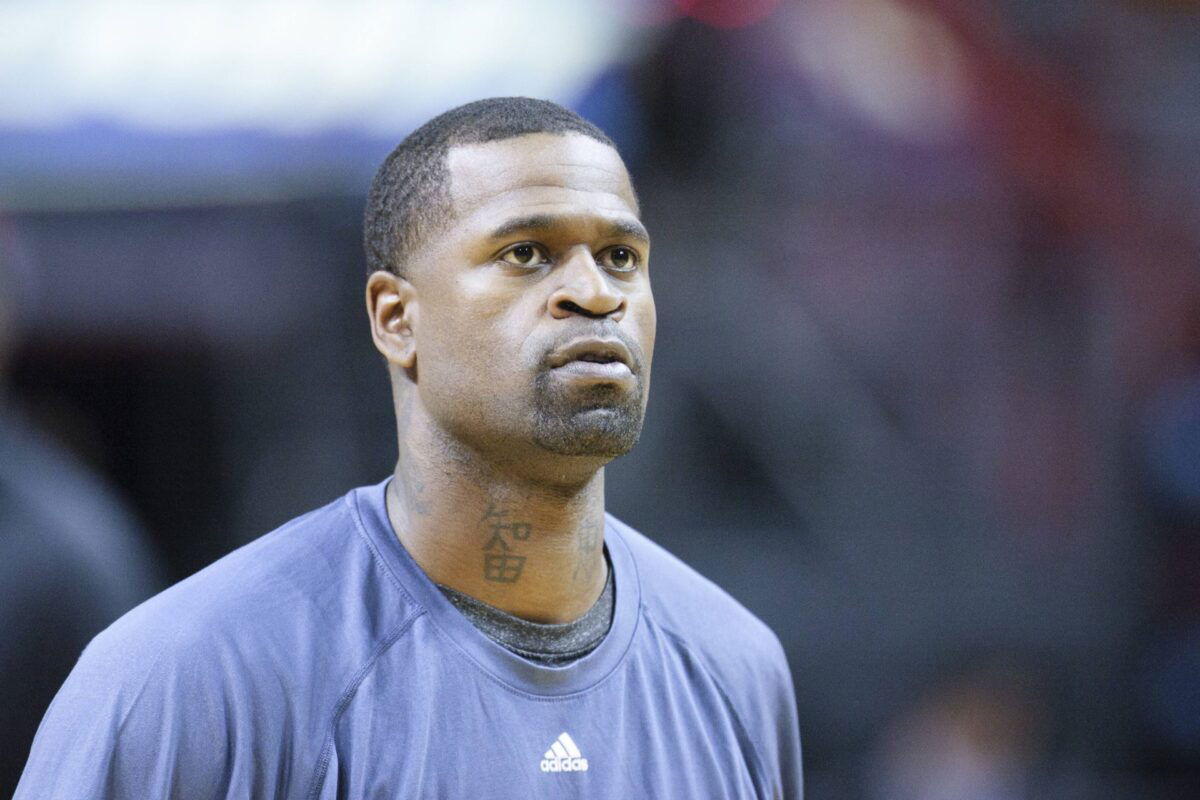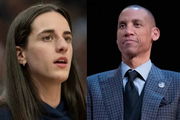
Imago
Bildnummer: 06891370 Datum: 19.11.2010 Copyright: imago/PanoramiC BASKET : NBA – Bobcats vs Heat – 19/11/2010 19 November 2010: Charlotte Bobcats shootingguard – 1 Stephen Jackson practices prior to the Miami Heat 95-87 victory over the Charlotte Bobcats at the AmericanAirlines Arena, Miami, Florida, USA. ChristopheElise/Panoramic PUBLICATIONxNOTxINxFRAxITAxBEL; xo0x Basketball Herren USA NBA Porträt vdig xng 2010 quer

Imago
Bildnummer: 06891370 Datum: 19.11.2010 Copyright: imago/PanoramiC BASKET : NBA – Bobcats vs Heat – 19/11/2010 19 November 2010: Charlotte Bobcats shootingguard – 1 Stephen Jackson practices prior to the Miami Heat 95-87 victory over the Charlotte Bobcats at the AmericanAirlines Arena, Miami, Florida, USA. ChristopheElise/Panoramic PUBLICATIONxNOTxINxFRAxITAxBEL; xo0x Basketball Herren USA NBA Porträt vdig xng 2010 quer
It’s easy to remember Stephen Jackson as the gritty NBA vet who never backed down—whether on the court or behind a mic. He brought fire to every team he played for, especially during his championship run with the Spurs in 2003. But long before the NBA spotlight, Jackson was just a kid from Port Arthur, Texas, raised in the thick of struggle. Behind the tough exterior lived a boy shaped by pain, one who carried those early hardships with him through his 14-year NBA career.
Watch What’s Trending Now!
Now, years later, the weight of one particular tragedy still lingers. During a recent episode of The Skip Bayless Show, Jackson opened up about a loss that shook his world—his younger brother, Donnie Jackson, who died in a car crash back in November 2022. According to Port Arthur Police Chief Tim Duriso, they believe Donnie may have suffered a medical emergency that led to the accident. “An officer at the scene attempted CPR on Jackson,” Duriso said that time. He was rushed to a hospital, but it was too late.
What makes it even harder is how much Donnie meant to the people around him. Like Stephen, Donnie was a hooper too—playing for the Southeast Texas Mavericks. After his death, Coach Steve Tucker wrote a heartfelt tribute: “He was truly what our Mavericks were all about… When he was called on he was always ready, like that night in Jackson, MS… Donnie’s Will to Win was always evident! Donnie will be missed by many. What I will miss was Donnie’s infectious smile and his love for the game.”
ADVERTISEMENT
Then came Stephen Jackson’s heartbreaking account of how it all unfolded. “Three years ago, he was getting ready to go out of town, and he had to pick up his son,” Jackson shared. “And he was coming out of Target, like two blocks from his house. And his heart just stopped. He ended up hitting a pole. And he hit the pole, and they ended up getting there. And they pulled him out of the car and tried to resuscitate him, and his heart just stopped. He was 42 years old.”
The loss of his brother clearly had a profound impact on Jackson, adding another layer of depth to the public persona we often saw as fiercely competitive. It’s a stark reminder that even the toughest athletes carry personal burdens and that grief can reshape our understanding of their experiences, both on and off the court.
ADVERTISEMENT

ADVERTISEMENT
Even more gut-wrenching, the pain runs deep through the family. “Sorry to hear that,” Bayless said gently. However, this is not the only past moment Jakson opened up. Recently, he talked about the infamous “Malice at the Palace” incident and left Reggie Miller in Tears.
Stephen Jackson apologizes to Reggie Miller for a 21-year-old event
Some wounds just need time—and the right moment to heal. Indiana Pacers legend Reggie Miller and his former teammate Stephen Jackson sat down face to face on All The Smoke, finally breaking the silence on what happened 21 years ago during the infamous “Malice at the Palace.” The episode didn’t shy away from the chaos that went down between the Pacers, the Pistons, and even the crowd. With Miller joining as a special guest, the conversation felt more like a long-overdue heart-to-heart than just another podcast moment.
ADVERTISEMENT
Jackson’s apology to Miller wasn’t just a simple acknowledgment of wrongdoing; it was a moment of vulnerability and growth. It speaks to the complex emotions that can linger long after the heat of the moment, and the power of forgiveness in healing old wounds and strengthening bonds, even in the world of professional sports.
What made it hit even harder was Jackson’s raw admission. “I never got a chance to apologize to you for my actions,” he said. “Now with me saying that, I love you even more because you defended me… I wasn’t out there being a thug or nothing like that.” He went on to ask Miller about how things had been with their old squad since then, and it was clear he’d carried this weight for a long time.
Top Stories
Everyone Notices Caitlin Clark’s Reaction After Reggie Miller’s Viral “Disrespect” on NBC

Giannis Antetokounmpo Joins Warriors in $80.28M Proposed Trade That Also Benefits Bucks, Per Insider

“Caitlin Will Take Care of That”: LeBron James’ Embarrassing Moment Gets No Mercy From NBC Announcers

“You’re Gonna Be Fat”: Klay Thompson’s Father Issues Warning Over Marrying Megan Thee Stallion

Giannis Antetokounmpo All but Confirms Warriors Trade With 6-Figure Decision: NBA Rumor

Still emotional, Miller didn’t miss a beat. “You don’t need to say that to me, come on man,” he told Jackson. He went on to call those final seasons in Indiana “my best years,” lifting up his younger teammates by name. For a second, the energy in the room just paused. Respect doesn’t always need loud moments.
ADVERTISEMENT
Of course, social media jumped on it instantly. Kevin Garnett shared it with “BIG BRO HIMSELF REGGGIE REGGIE REGGGIE,” while Candace Parker simply said, “Man 😭.” But it didn’t just stop here. But why is this event so emotional? Perhaps the incident serves as a harsh lesson: chaos can swiftly overturn potential and reshape legacies.
ADVERTISEMENT
ADVERTISEMENT
ADVERTISEMENT